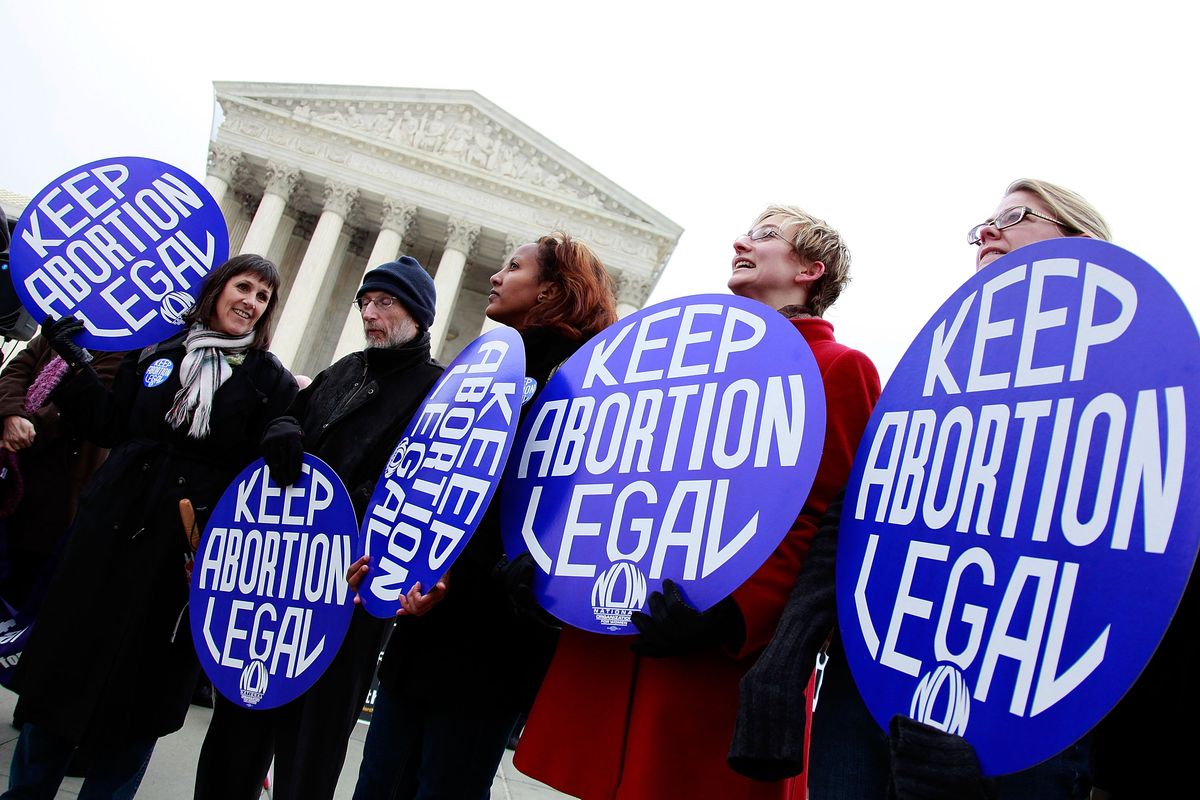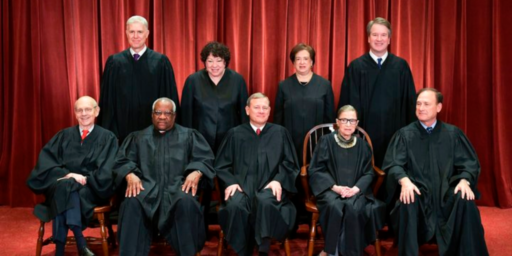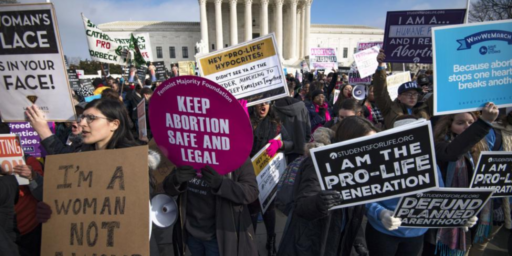Supreme Court Strikes Down Louisiana Abortion Law
A reprise of an almost identical case with a different group of Justices--and the Chief Justice switching sides.

ABC News (“Supreme Court hands down major decision reaffirming abortion rights“):
The Supreme Court announced a major ruling on abortion, deciding that the Louisiana law should not stand.
The opinion was written by Justice Stephen Breyer, joined by Justices Ruth Bader Ginsburg, Sonia Sotomayor and Elena Kagan. Chief Justice John Roberts also filed an opinion concurring for the majority.
The case, June Medical Services v. Russo, was a challenge to a Louisiana law that required abortion providers have admitting privileges with a nearby hospital — an agreement between a doctor and a hospital that allows a patient to go that hospital if they need urgent care.
Abortion providers argued this was an unnecessary requirement unrelated to health outcomes that only served to prevent them from being able to provide abortion care. Admitting privileges can be difficult for abortion providers to obtain as hospitals do not want to be associated with them due to the stigma and as abortion is a statistically safe procedure, requiring extremely limited numbers of patients to have to go to hospitals for care.
If the particulars seem familiar to you, it’s because the Supreme Court already ruled on almost exactly the same law, just one state over, four years ago.
In fact, in 2016, the Supreme Court ruled, in Whole Woman’s Health v. Hellerstedt, that a nearly identical hospital admitting privileges law out of Texas caused an “undue burden” on patients seeking abortions after it caused roughly half of clinics in the state to shut down. In the 2020 opinion, Breyer called the Louisiana law “almost word-for-word identical to Texas’ admitting-privileges law.”
“This case is similar to, nearly identical with, Whole Woman’s Health. And the law must consequently reach a similar conclusion. Act 620 is unconstitutional,” Breyer wrote in conclusion on the June Medical opinion.
That 2016 case set what was supposed to be a precedent that laws like Texas’ that “‘do little or nothing for health, but rather strew impediments to abortion’ cannot survive judicial inspection,” Justice Ruth Bader Ginsburg wrote in a concurring opinion, referencing a lower court case.
So, why did the Court even hear the case? The precedent had been set?
However, in 2018, the Fifth Circuit Court of Appeals surprised court watchers by reversing a decision on the Louisiana law that struck it down based on the 2016 Supreme Court case. Instead, the Fifth Circuit ruled Louisiana’s admitting privileges law could stand. It was that action that led the case, ultimately, to the Supreme Court.
Since 2016, the Supreme Court’s makeup has changed. Justice Anthony Kennedy represented the swing vote on abortion in the 2016 case, then siding with the liberal-leaning justices. Following Kennedy’s retirement in 2018 and the death of Justice Antonin Scalia in 2016, their replacements — Neil Gorsuch and Brett Kavanaugh — are seen as more conservative.
So, basically, the 5th Circuit ignored recent precedent from the Supreme Court, hoping that the two Trump appointees—and, really, the replacement of the swing vote, Kennedy, with Kavanaugh—would change the outcome given another bit at the apple.
Well, surprise, surprise:
Chief Justice Roberts had been on the dissenting side of the Texas Whole Woman’s case. In his concurring opinion with the majority on June Medical, Roberts explained that he still believed his 2016 opinion that “the case was wrongly decided,” but he joined the majority this time around because “the question today” is on “whether to adhere to [the Whole Woman’s case] in deciding the present case.”
Many have speculated that Roberts sided with the majority in the recent LGBT rights case so that he, not Ginsburg, would get to decide who wrote the opinion. But, here, he was the swing vote. Why didn’t he simply reprise his vote in the Texas case and have it go 5-4 the other way?
Looking to his concurrence, he explains,
The legal doctrine of stare decisis requires us, absent special circumstances, to treat like cases alike. The Louisiana law imposes a burden on access to abortion just as severe as that imposed by the Texas law, for the same reasons. Therefore Louisiana’s law cannot stand under our precedents.
He goes on to give the standard explanation of why stare decisis is the bedrock of a common law system, citing everything from Blackstone to the Federalist.
While I fully understand why the Chief Justice would be wary of drawing attention to the political nature of the court by reversing such recent precedent, his votes on the other side of the abortion question in the 2016 case and others have the effect of undermining Roe, which has been precedent for nearly half a century and is widely considered “settled law.”
His explanation is not fully satisfying:
Stare decisis is not an “inexorable command.” Ramos v. Louisiana, 590 U. S. , (2020) (slip op., at 20) (internal quotation marks omitted). But for precedent to mean anything, the doctrine must give way only to a rationale that goes beyond whether the case was decided correctly. The Court accordingly considers additional factors before overruling a precedent, such as its adminstrability, its fit with subsequent factual and legal developments, and the reliance interests that the precedent has engendered. See Janus v. State, County, and Municipal Employees, 585 U. S., -___ (2018)
But the rest of the opinion is somewhat more satisfying. He argues that Casey, not Roe, is the controlling precedent and it “requires that courts consider the burdens a law imposes on abortion access together with the
benefits those laws confer.” And, he argues at length, our traditions require that the courts grant great deference to the judgment of legislators in the making of public policy decisions.
Still, after a journey through post-Casey precedent, he ultimately comes back to the fact that the Louisiana law in question here was nearly identical to the Texas law. Additionally, he cites an old case waxing philosophical about the advantages trial court judges have over appellate court judges and why they are therefore due deference.
We accordingly will not disturb the factual conclusions of the trial court unless we are “left with the definite and firm conviction that a mistake has been committed.” United States v. United States Gypsum Co., 333 U. S. 364, 395 (1948). In my view, the District Court’s work reveals no such clear error, for the reasons the plurality explains. Ante, at 19-35. The District Court findings therefore bind us in this case.
Stare decisis instructs us to treat like cases alike. The result in this case is controlled by our decision four years ago invalidating a nearly identical Texas law. The Louisiana law burdens women seeking previability abortions tothe same extent as the Texas law, according to factual findings that are not clearly erroneous. For that reason, I concur in the judgment of the Court that the Louisiana law is
unconstitutional.
I’ll be interested to see legal experts at SCOTUSBlog and elsewhere weigh in on this.
My immediate sense is that this is a case that court should have just send back to the 5th Circuit with a curt note to look at the damn 2016 precedent cited by the trial judge. I’m not sure we needed dozens of pages reaffirming a recent precedent in an almost identical case; indeed, it strikes me that doing so is practically an invitation to relitigate cases that were narrowly decided on the basis of Kennedy’s vote.
Which may be the best explanation for the Chief Justice’s concurrence: a signal that he’s prepared to vote to keep those precedents intact absent compelling differences in fact or evidence that the decision had unanticipated negative consequences.






I seem to remember that Susan Collins spoke with Kavanaugh privately and was assured that he felt that Casey was settled law.
I’m also surprised by Gorsuch’s position. He seems to have much more integrity than Kavanaugh. But not on this, perhaps because abortion is EEEEEVIL, so we have to find some way around it.
So apparently all those complaints about “activist” judges were envious?
We are one healthy RBG away from settling the abortion issue permanently.
Fortunately for Republicans they can now be less reliant on screaming ‘murder’ at women as a fundraising device – they’ve moved on to screaming, ‘ni**er!’
I suspect that it’s only after you’ve had a law course on Constitutional Law that you develop the necessary cynicism about SCOTUS decisions. Guys–don’t try to find that much logic in how SCOTUS decisions are made. It’s a “gut feeling” decision which is then backwards-engineered to come up with legal reasons that sound plausible. Then there are the meta-reasons. Justice Roberts is worried about the reputation of the Supreme Court and its continued authority, so he has been acting as a “balancer” on a lot of decisions, trying to keep overall SCOTUS decisions as consistent as possible. Hence the seeming flip-flops on his part.
SCOTUS is in fact logical. It’s just that they’re working according to meta-facts and a bitter knowledge that they can’t get too much out over their skis or the whole system can collapse on them. They’re in fact the weakest of the branches of government and they know it.
@grumpy realist: I’ve had a few conlaw classes and even taught it a couple times. It’s certainly true that Justices’ stated judicial philosophies often wind up conveniently aligning with their preferred policy outcomes. But the fact that every case in a given term doesn’t wind up with the same divide demonstrates that it’s more complicated than just backwards engineering to arrive at the desired outcome. Justices often vote against their policy preferences, confounding outside observers.
In this case, Roberts clearly thinks Texas and Lousiana should be able to impose absurd restrictions on abortion rights. But, because of the Texas outcome, he feels bound to rule the same way in Louisiana.
Now, I do agree that some Justices—and the Chief Justice in particular—are worried about not seeming arbitrary. There is definitely a “Wizard of Oz” quality to the court’s power.
@grumpy realist:
I’m getting really worried about what Roberts is saving their reputation and authority for.
Robert’s is very much an institutionalist and this ruling like the LBGT case is about preserving the courts reputation and not allowing it to stray too far from public opinion. The fact that the precedent that he sights is so recent and under aegis of his time as chief justice is a fact not to be ignored.
There are many Dems who are itching to expand the court and to overturn Hellerstedt and by extension Casey would have turned that itch into a crusade.
I keep going back and forth in my mind over whether Roberts is a coward or a true believer in a limited Supreme Court. The only thing he appears to be consistent on is that the Courts should have a very limited role compared to the Executive and Legislative branch. Every major decision seems to boil down to pushing the buck to someone else, whether that be another branch of government or public opinion polls. I honestly can’t decide if he’s trying desperately to signal a dysfunctional Congress and President to get their bleeping act together in a sincere belief that the Court has previously “legislated from the bench” and he won’t do that no matter what, or just trying to duck.
What do you mean by this?
So a quick question to all those Republicans who understand that Trump is a dangerous psychopathic criminal who is looting the country and threatens our entire system but have continued to support him because of the courts:
How’s that working out for you?
So much winning!
Mods…I just tried to edit a long post I just put up that warned me it was flagged as spam. Can someone please release me from moderation?
One of many reasons to expand the size of the court is to counter Republican perfidy…what they did with Merrick Garland was unconscionable and they shouldn’t be allowed to benefit from that, even though Gorsuch isn’t exactly the slam dunk they thought he would be…the poor dears…
@wr: If we were in the bottom of the 9th, that would be a different question, but we’re not, and it’s a long game. It’s possible, even likely, that Roe has the “collision with itself” that Justice O’Connor talked about so many years ago, and even if the country dodges it, there are still immigration, civil rights, environmental and economic regulatory, voters’ rights, and other issues with many battles still to be fought.
The ugly rwnj that I was in a past life, looks at the overall picture and says “pretty good, we’re making progress.”
@Teve:
I think if RBG lasts til Biden is in office we replace her when she’s ready and we have a pro-choice majority for years. Generational change will kill the issue. It has no future in the under 40 demo.
@Michael Reynolds: I just looked at abortion trends by age and you might be right.
But I think the more likely outcome is that the exact right case comes up for Roberts and Roe is overturned* and abortion is state by state. If you’re in California, fine, if you’re in Mississippi you’re screwed if you don’t have money.
* For deeply principled legal reasons of course.
Rod Dreher over at TAC is having the predictable meltdown over this decision, by the way. I really wish he wouldn’t make legal arguments when it really boils down to “I don’t like this.”
(And his idea about “condensed symbols”? Sheesh! “Hi, we’re going to remove your human rights from you because you happen to be a condensed symbol and we have to worry more about the symbolism than actual humans.”)
@grumpy realist:
Check out Dahlia Lithwick’s new piece at Slate on Roberts.
@grumpy realist:
This religious liberty thing.
I get that a religious institution may want to employ only like minded folks. I get that and I understand that within reason.
If such an institution decided to open a charity should that principle apply. You are no longer solely a church then.
Over thinking this. Dreher wants carte blanche to discriminate. He can pretzel himself up, but that is what he is after. Screw him.
Stop reading Dreher! There is no there there.